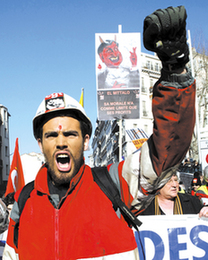昨日,新一轮的全国性罢工席卷法国,愤怒的工人们要求总统萨科奇就政府抵御经济危机出台新的应对措施。自经济陷入低迷以来,法国共发生了200多次示威游行。调查显示,这些示威游行得到了四分之三法国公众的支持,由此也表明民众开始对萨科奇的改革承诺信心渐失。此次罢工致使交通、能源以及部分政府机构受到影响,巴黎及里昂、斯特拉斯堡等城市的城际高速铁路和轻轨也因罢工而陷入严重瘫痪状态。

 |
|
A new wave of nationwide strikes hit France yesterday as angry workers demanded that President Nicolas Sarkozy open new talks on the government's policies to fight the deepening economic crisis.
|
A new wave of nationwide strikes hit France yesterday as angry workers demanded that President Nicolas Sarkozy open new talks on the government's policies to fight the deepening economic crisis.
By mid-afternoon, tens of thousands of protesters from the public and the private sectors, including employees of Air France and oil giant Total, were marching in the streets of France's biggest cities: Paris, Marseille and Lyon.
More than 200 protest marches were under way around the country as economic news worsened.
The protests, which polls show are backed by three quarters of the French public, reflect growing disillusionment with Sarkozy's pledges of reform.
The crisis has sent the number of jobless past two million and left many people struggling with the high cost of living.
Transport, energy and some government offices were all affected as workers went off the job, although there was no general shutdown of the economy. Most businesses and public services functioned at close to normal levels.
The French economy is shrinking at the fastest pace in over 30 years, the national statistic agency said in a new report yesterday. The economy's contraction will accelerate to 1.5 percent in the first quarter, its worst performance since 1975.
Union leaders wanted the government to take stronger steps and were hoping for firm guidance when Prime Minister Francois Fillon went on national television yesterday evening.
A strike in late-January put between 1 million and 2.5 million people into French streets. Weeks later, Sarkozy announced measures to help people affected by the financial crisis, including special bonuses for the needy. Union leaders say that is not enough.
Sarkozy told ministers at a Cabinet meeting on Wednesday that he "understood the worries of the French," but said he had no plans for additional measures.
Budget Minister Eric Woerth said the measures already announced would increase social expenditures in 2009 by nearly 10 billion euros (about $13 billion).
Between 40,000 and 50,000 people marched in the northern city of Rouen, organisers said, while in the port city of Le Havre, unions said 35,000 people took part in protests. Police put the number in Le Havre at only 10,000.
High speed TGV intercity trains and suburban rail services in Paris and a number of provincial cities, including Lyon, Bordeaux and Strasbourg, were heavily affected, although most Paris metro services were running close to normal.
Energy workers also cut off 10,000 megawatts of French electricity production capacity overnight, including 14 percent of nuclear capacity in 11 different plants, the CGT union said.
(Agencies)

相关阅读
失业率攀升 澳削减技术移民
经济低迷 美国女性捐卵挣钱
日本“苦难之神”让大家泄愤
(英语点津 Helen 编辑)